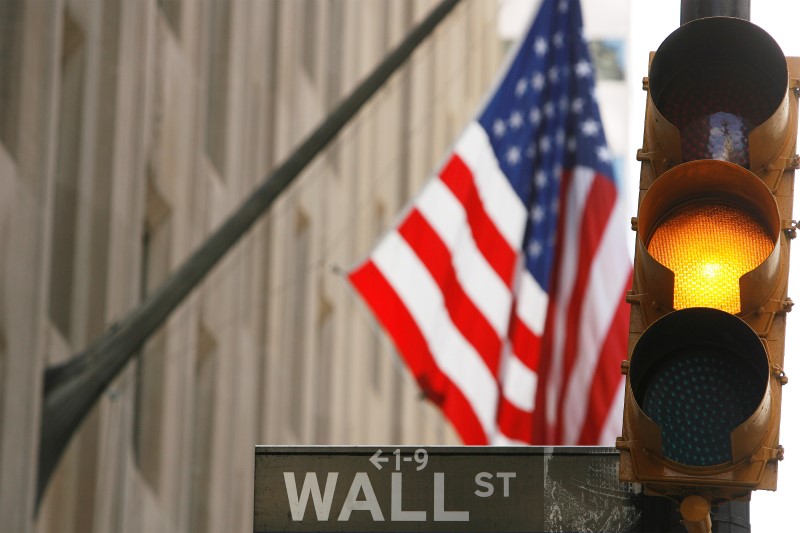Investing.com -- U.S. stocks point higher ahead of a week of major corporate results and key economic data. Amazon and Apple are set to round out a multi-week crush of earnings from Big Tech, while nonfarm payroll figures for July could provide clues into the impact of over a year of Federal Reserve policy tightening.
1. Futures edge higher
U.S. stock futures inched up on Monday, but stayed close to the flatline, as investors looked ahead to a fresh batch of tech earnings and key U.S. employment data this week.
At 05:12 ET (09:12 GMT), the Dow futures contract had gained 18 points or 0.05%, S&P futures added 4 points or 0.08%, and Nasdaq 100 futures moved up by 8 points or 0.05%.
The main indices remain on track to post monthly gains before the final trading day of July. The Dow Jones Industrial Average, which saw its longest win streak since 1987 snapped last week, is up 3.1% this month, while the S&P 500 has climbed 3% and the tech-heavy Nasdaq Composite has added 3.8%.
As July turns to August, traders are awaiting earnings later in the week from Amazon and Apple, as well as chipmakers AMD (NASDAQ:AMD) and Qualcomm (NASDAQ:QCOM).
Meanwhile, the crucial U.S. nonfarm payrolls report for July is due out on Friday, with economists predicting that the world's biggest economy added fewer jobs compared to the prior month.
2. Amazon and Apple results ahead
E-commerce giant Amazon (NASDAQ:AMZN) and iPhone-maker Apple (NASDAQ:AAPL) will both report their latest quarterly results on Thursday, rounding out a wave of closely-watched Big Tech earnings in recent weeks.
Focus will likely hover around how the companies' revenue flows fared during a three-month period marked by economic uncertainty that has persuaded some businesses and individuals to rein in spending.
For Amazon, attention will likely turn to its all-important cloud computing unit, Amazon Web Services, where growth decelerated in the previous quarter. Amazon has also flagged that the slowdown at the division continued into April.
Apple, meanwhile, will deliver its first results since the unveiling of its highly-anticipated Vision Pro headset in June. Despite the excitement around the device, weaker consumer demand is expected to weigh on other products like the iPhone and iPad.
Analysts may also be keen to question Amazon and Apple executives about their plans for artificial intelligence (AI). Last week, tech peers Microsoft (NASDAQ:MSFT), Facebook-owner Meta Platforms (NASDAQ:META), and Google-parent Alphabet (NASDAQ:GOOGL) cautioned that spending levels may soon rise as they race to develop AI tools.
3. U.S. jobs report highlights economic calendar
Hiring in the U.S. is projected to have slowed in July, but the job market is expected to remain relatively tight even in the face of aggressive Federal Reserve interest rate hikes.
Economists predict that total nonfarm employment rose by 200,000 during the month, down from the June reading of 209,000, while the jobless rate is expected to remain steady at 3.6%.
The labor market has been a major focus of the Fed's long-standing monetary tightening campaign, with policymakers arguing that a loosening in employer demand could help alleviate inflationary pressures. The Fed increased interest rates by 25 basis points last week, but suggested that any future decisions would be "data-dependent."
Despite signs of moderation, job growth has remained robust in recent months. The strength has in turn fueled speculation that the Fed may be able to engineer a so-called "soft landing" -- corralling inflation without sparking a meltdown in the broader economy.
Friday's figures may provide more clarity on this key question.
4. SEC asked Coinbase to halt all non-Bitcoin trading - FT
The U.S. Securities and Exchange Commission requested that Coinbase (NASDAQ:COIN) cease trading in all digital tokens except for Bitcoin prior to filing a lawsuit against the cryptocurrency exchange, according to the Financial Times.
In an interview, Coinbase Chief Executive Brian Armstrong told the paper that the SEC "said...we believe every asset other than bitcoin is a security." Armstrong added that the regulators then asked that Coinbase delist all of the more than 200 tokens it offers to customers, apart from Bitcoin.
Armstrong refuted the claim, saying that agreeing to the shutdowns "would have essentially meant the end of the crypto industry in the U.S." Instead, he said Coinbase decided to challenge the SEC's assertions in court.
The SEC has been angling to gain more control over the crypto industry, with Chair Gary Gensler arguing that most cryptocurrencies qualify as securities, or tradeable financial assets. Coinbase was sued by the SEC last month for failing to register as a broker.
Should the SEC win this case, it could set a precedent for the power regulators in the U.S. have over crypto businesses and potentially lead to more stringent compliance rules.
For its part, the SEC told the FT that its enforcement division did not make formal requests for "companies to delist assets." It also declined to comment on what the delisting would mean for the crypto industry.
5. Walmart boosts Flipkart stake - WSJ
Retail giant Walmart (NYSE:WMT) has increased its stake in Flipkart through a $1.4 billion purchase of shares from a major investor in the Indian e-commerce group, according to the Wall Street Journal.
Walmart bought New York-based hedge fund Tiger Global's remaining shares in Flipkart, the paper reported, citing a letter sent by Tiger to its investors. The transaction valued Flipkart at $35B, down from the almost $38B attached by Tiger to the company in 2021.
Meanwhile, Walmart also bought out private equity firm Accel's remaining 1% stake in Flipkart, the Economic Times newspaper reported, although the size of the purchase was unknown.
The moves increase Walmart's exposure to Flipkart at a time when the Arkansas-based company is looking to expand its presence in the digital commerce space. Walmart paid $16B more than five years ago for an initial 77% stake in Flipkart, a wide-ranging business catering to more than 450 million customers.
